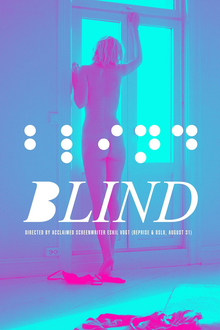For Those in Peril (Paul Wright, UK, 2013)
Aaron is the only survivor after a catastrophy at see, claiming five lives including his older brother Michael. All of the inhabitants in the small Scottish village looks at him with unease, some even blaming him for the disaster. And obviously, Aaron has survivor's guilt and PTSD to spare. And wasn't he a bit weird, even to begin with?
That is the simple premise of Paul Wright's film. That is really all there is to it. We follow Aaron around as he tries to reach out, but also retreats into himself whenever asked about the disaster. And it goes downhill. Intercut is old homevideos of Michael and the rest of the family, as well as news clips on the disaster, and weird impressionistic sequences dealing with the towns mythologizing of the sea. Voiceovers abound, from Aaron, Michael and a Greek chorus of villagers. And there is obviously weird music.
I've heard people are describing it as being a bit like Terrence Malick. Which is half-right, impressionistic montages with voice-over, that's Malickian. But it is more like cod-Malickian, more like a film such as Beasts of the Southern Wild - except not that good. Whereas in Malick, the style creates a world and searches for life or God or Wonder, in this film Paul Wright makes sure to root the stylistic flourishes in easily understood ways. Oh, it's depicting the news coverage of accidents like this. Oh, where getting inside a damaged mind. Oh, now we're recovering repressed traumas. It becomes insular, smaller, and more safe. The film dives into the mythology of the ocean, but it keeps it all at bay by showing Aaron as more and more insane.
And then there's the end. Yeah, spoilers and all that, but for the second time in a row, I feel like I should point out that the end is pretty bullshit. It's not that it isn't inventive, and it makes way more sense than the insane ending in Real. But it's also a really boring and obvious way to end the film, and thematically, it just muddles everything, while giving off a vibe of vague happiness. Meh. I consider this a miss. It's an ok film, but nothing more than that, I don't think. Paul Wright has talent, and if he cuts down on the klichés and moves in a more daring direction, then he could make something good. But that's rarely what happens, right? Someone who let such a small and personal film be flawed by so many klichés will rarely become more personal as the budgets become bigger... Even so, worth checking this one out, and the next thing he does. I will scratch my head if it wins, though.
Luton (Michalis Konstantatos, Greece, 2013)
Ruminations on an enigmatic title: The British town Luton, where a character is sent at the end of this film, has apparantly been named the most boring town in the world. If you put Luton into google translate, you get asked if you wanted to write λυτών or lytó̱n, meaning 'catalysts'.
This is an enigmatic film. The plot considers the daily life of three, seemingly unconnected characters, and the significance only becomes clear late in the film. For most of the film, any plot is so slight as to be non-existiant. What keeps the film watchable and often riveting is the formal qualities. Long-held and static shots showing only part of the actors faces. There is a brilliant long zoom-in on a couple of tounguekissing teenagers. Another impressive handheld shot follows a young woman in a clothing shop, until it settles on a mirror, catching three characters at once, and it is a brilliant composition. There are several of these handheld, shaky shots of characters in public, often with unnerving jingle-music in the background, and they never stop being off-putting and alienating. Actually, most of the film is brilliantly filmed, and for that reason alone I whole-heartedly recommend it.
I don't know how profound I find it, though. The director was there, and he talked about trying to capture real life with these long shots, and well, if that was the point, then I think he failed. He's stylized the world, and it didn't feel so real to me. It felled like a satire, an exhaggeration, which isn't negative in any way, I probably prefer films that do that. But it isn't real life. And that problem might muddle the latter section where hum-drum reality is shattered and the themes of the film becomes clear. But it was never really real life, and the characters were perhaps not developed enough so that their later choices hit with the force that it was supposed to. As such, the impact of the film is slightly blunted.
That's a problem, but it doesn't kill the film. And it's a problem I imagine could be gone with the directors next film, and with his strong sense of the possibilities of film, the next one could be truly great! Also, despite it's flaws, I would have nothing against it winning the grand prize. It's my personal favourite of the three, but I'm a sucker for this kind of thing.
Blind (Eskil Vogt, Norway, 2014)
Luton wont win, though. Not with Blind in the competition. Blind seems like the perfect winner: It's a crowdpleaser, it has visual style - though not enough to be off-putting to anyone - and it has name-recognition. Eskil Vogt used to work with his more famous compatriot Joachim Trier, who's film I've yet to see. But who has quite a name, very much so in Denmark. The cinema was completely packed, as far as I could see.
We got to see a very fine and inventive film. Ingrid is a writer, who has turned blind. She spends her days in her appartment, afraid to go out - in a frightening black scene with a cacophony of street-sounds over it, we feel what she's afraid of. Instead, she invents a story with a love-triangle, between Einar, a loner with a porn-addiction, Elin, a divorced mother from Sweden, and Ingrid's own husband, Morten. The film cuts back and forth between those two stories, sometimes in the same scene, as we switch from the real world to the world Ingrid imagines. Ingrid does a sexy little striptease in front of Morten, and he seems really aroused, but then we hear clicking-sounds and we realize he has been writing on a computer the whole time. All of a sudden, there is a computer in the scene. Dejected, Ingrid goes to sleep, and then we see that Morten actually is chatting with Elin! Obviously, we're back inside the head of Ingrid.
The whole film is full of inventive stuff like this. As such, it becomes a really visual film. What could have been a boring shot-reverse-shot scene between Einar and Morten is enlivened by Ingrid's voiceover, as well as her inability to decide whether it takes place in a café or on a bus. There is an absolutely brilliant sequence a short way into the film, depicting the development of Einar's porn-addiction, which means this film has more naked people in it than most films I've seen. And also, while that set-up could have let to something really boring and moralistic, it's pretty nuanced. Watching fetish-porn makes him learn stuff about himself. Watching 'natural' girls means that he can't stop imagining what all the woman on the street looks like while masturbating. But this sequence is eclipsed by another one later on, dealing with the aftermath of Utøya. Just devastating, and the point at the end - that everyone was now a bit scared of reclusive men like Einar - is really tough to take.
This is a small but smart film. It can both lambast Morten for being afraid to make a funny racist joke, while still making sure to point out later on the joke was factually wrong. It has a great script, great acting, and a fine visual style. I did not like the conclusion, though, which seemed a bit bland in it's epiphanies. Until then it was a lark, and the actual final scenes were once again daring and fun. I'll put my money on this to win, even though I'm probably more a fan of the formalism in Luton.



Ingen kommentarer:
Send en kommentar